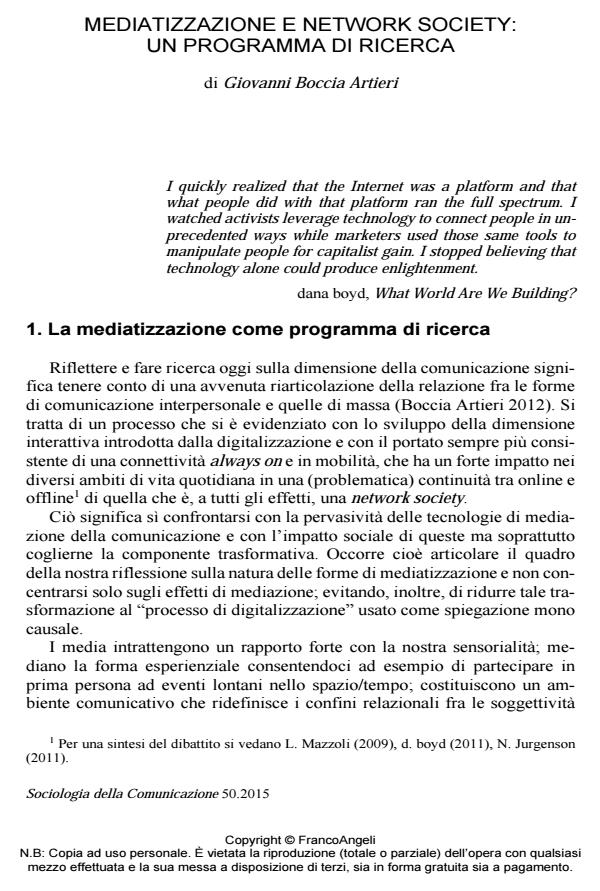Mediatization and Network Society: A Research Agenda
Journal title SOCIOLOGIA DELLA COMUNICAZIONE
Author/s Giovanni Boccia Artieri
Publishing Year 2016 Issue 2015/50
Language Italian Pages 8 P. 60-67 File size 205 KB
DOI 10.3280/SC2015-050006
DOI is like a bar code for intellectual property: to have more infomation
click here
Below, you can see the article first page
If you want to buy this article in PDF format, you can do it, following the instructions to buy download credits

FrancoAngeli is member of Publishers International Linking Association, Inc (PILA), a not-for-profit association which run the CrossRef service enabling links to and from online scholarly content.
The contribution analyses the social change from the point of view of the mediatization approach. The concept of mediatization has to be distinguished from that of mediation, because it identifies a meta-process of cultural and social transformation such as urbanization, globalization and individualization. This meta-process is influenced -but not determined - by media and it refers to the ability of media to spread their format or to impose specific frame in the lifeworld. On this basis, the article identifies three strands of the debate about mediatization - institutionalist, social constructivist, material - and then identifies the systemic approach as an important corrective to the limits of the three approaches. The systemic approach, using the themes of "synchronization" and "irritation" among the social systems and the "media logics" shows how the mediatization is a complex process that must also include non-media factors and agency of subjects. In summary, the mediatization is a meta-process that can not be reduced to specific techno-communicative devices and therefore has a more abstract generalized valence. But at the same time the mediatization does not incorporate an (average) unitary logic and therefore can only be observed through the specificity of the media practices. Ultimately the mediatization is not proposed as a new paradigm or as a middle-range theory. Rather it is a guiding concept for the empirical exploration of the social transformations that takes into account how it is today intensified media’s saturation of social interaction.
Keywords: Mediatization, media studies, media practice, performance.
- David A.L., Snow R.P. (1979), Media logic, Sage, Beverly Hills.
- Boccia Artieri G. (2004), I media-mondo. Forme e linguaggi dell’esperienza contemporanea, Meltemi, Roma.
- Boccia Artieri G. (2012), Stati di connessione. Pubblici, cittadini e consumatori nella (Social) Network Society, FrancoAngeli, Milano.
- boyd d. (2011), Social Network Sities as Networked Publics: Affordances, Dynamics, and Implications, in Z. Papacharissi (ed.), A Network Self, Identity, Community, and Culture on Social Network Sites, Routledge, London.
- Butler J. (1993), Bodies That Matter, Routledge, New York; trad. it. (1996), Corpi che contano, Feltrinelli, Milano.
- Couldry N., Hepp A. (2013), Conceptualizing Mediatization: Contexts, Traditions, Arguments, in «Communication Theory», 23(3), pp. 191-202.
- Deacon D., Stanyer J. (2014), Mediatization: key concept or conceptual bandwagon, in «Media, Culture & Society», 36(7), pp. 1032-1044.
- Deacon D., Stanyer J. (2015), “Mediatization and” or “Mediatization of”? A response to Hepp et al., in «Media, Culture & Society», 37(3), pp. 655-657.
- Hepp A. (2013), The communicative figurations of mediatized worlds: Mediatizationresearch in times of the “mediation of everything”, in «European Journal of Communication», n. 28, pp. 615-629.
- Gemini L. (2008), In viaggio. Immaginario, comunicazione e pratiche del turismo contemporaneo, FrancoAngeli, Milano.
- Hepp A., Hjarvard S., Lundby K. (2015), Mediatization: Theorizing the Interplay Between Media, Culture, and Society, in «Media, Culture & Society», 37(2), pp. 314-324.
- Hjarvard S. (2011), The mediatisation of religion: Theorising religion, media and social change, in «Culture and Religion», vol. 12, issue 2, pp. 119-135.
- Jurgenson N. (2011), Digital-dualism verses augmented-reality, in http://thesocietypages. org/cyborgology/2011/02/24/digital-dualism-versus-augmented-reality/
- Krotz F. (2009), Mediatization: A Concept With Which to Grasp Media and Societal Change, in K. Lundby (ed.), Mediatization: Concept, Changes, Consequences, Peter Lang, New York, pp. 21-40.
- Livingstone S. (2009), On the mediation of everything: ICA presidential address 2008, in «Journal of Communication», 59 (1), pp. 1-18.
- Livingstone S., Lunt P. (2014), Mediatization: an emerging paradigm for media and communication research, in K. Lundby (ed.), Mediatization of Communication: Handbooks of Communication Science vol. 21, De Gruyter Mouton, Berlin, pp. 703-723.
- Luhmann N. (1996), Die Realität der massenmedien, Westdeutscher Verlag GmbH,
- Opladen; trad. it. (2000), La realtà dei mass media, FrancoAngeli, Milano.
- Lundby K. (ed.) (2014), Mediatization of Communication. Handbooks of Communication Science vol. 21, De Gruyter Mounton, Berlin/Boston.
- Lunt P., Livingstone S. (2015), Is “mediatization” the new paradigm for our field? A commentary on Deacon and Stanyer (2014, 2015) and Hepp, Hjarvard and Lundby (2015), in «Media, Culture and Society».
- Mazzoli L. (a cura di) (2009), Network Effect. Quando la rete diventa pop, Codice Edizioni, Torino.
- Morozov E. (2014), Silicon Valley is turning our lives into an asset class, in «Financial Time», http://www.ft.com/intl/cms/s/0/9d2a73fe-a54a-11e3-8070-00144feab7de. html#axzz3yx8etpWA.
- Stutzman F., Gross R., Acquisti, A. (2012), Silent Listeners: The Evolution of Privacy and Disclosure on Facebook, in «Journal of Privacy and Confdentiality», vol. 4, n. 7, p. 41.
- Antidoto liveness. La performance dal vivo durante il Covid-19 Laura Gemini, in SOCIOLOGIA DELLA COMUNICAZIONE 60/2021 pp.104
DOI: 10.3280/SC2020-060010 - Social TV: Audience Engagement E Autorappresentazione Dell’identita’ in Rete (Social TV: Networked Publics Between Engagement and Identity Construction) Fabio Giglietto, Donatella Selva, in SSRN Electronic Journal /2013
DOI: 10.2139/ssrn.2256368 - Complessità. Una parola chiave per la comunicazione fra teorie e tecnologie Laura Gemini, in SOCIOLOGIA DELLA COMUNICAZIONE 57/2019 pp.97
DOI: 10.3280/SC2019-057007 - Un futuro "ecologico" per la comunicazione? Fausto Colombo, in SOCIOLOGIA DELLA COMUNICAZIONE 64/2023 pp.28
DOI: 10.3280/SC2022-064002 - Performing the role of media educator. Performative tools for media literacy from the TESEO project Vincenzo Del Gaudio, in Sociétés /2022 pp.83
DOI: 10.3917/soc.156.0083 - Algoritmi e vita quotidiana: un approccio socio-comunicativo critico Giovanni Boccia Artieri, Roberta Bartoletti, in SOCIOLOGIA DELLA COMUNICAZIONE 66/2024 pp.5
DOI: 10.3280/SC2023-066001
Giovanni Boccia Artieri, Mediatizzazione e network society: un programma di ricerca in "SOCIOLOGIA DELLA COMUNICAZIONE " 50/2015, pp 60-67, DOI: 10.3280/SC2015-050006